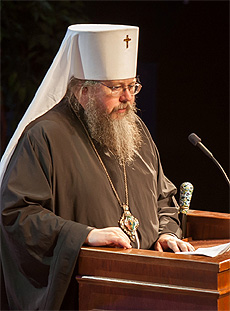
by Chris Banescu –
It is reassuring to the flock when a faithful shepherd preaches Christ and teaches the Truth at every opportunity. It is also uplifting for the laity to see an Orthodox Bishop who publicly and clearly proclaims and defends the unchanging moral teaching of the Christian faith and the Holy Orthodox Church. His Beatitude, Metropolitan Jonah, recently addressed the Anglican Church in North America (ACNA) and his comments showed the Church and those listening why he is a worthy leader of the Orthodox Church in America.
In his remarks, Metropolitan Jonah warns us about the radical departure from traditional Christianity we’re experiencing in the West and the dangerous consequences of such actions. He identifies key challenges that Christians face in the increasingly hostile and secularized culture we find ourselves living in and the increasing persecution we will encounter. He also emphasizes the importance of traditional Christian denominations to stand united in opposing such falsehoods.
I have highlighted below several important points and observations from his speech. His words must be shared with the rest of the Orthodox Church and other Christians. The full text of his address is also reproduced further down.
(1) We are all in a serious battle with secularism. Christians must stand together and proclaim the True Christian faith, without alteration, without change, without revisions.
Our battle is against secularism. His Holiness, Pope Benedict XVI, has called for us to stand together against this enemy. This is the realignment: to stand together for the faith once delivered by Christ to the Apostles, and thence to the Bishops, without alteration, without change, without revisions; against those who would submit their faith to the current of the age, the wisdom of this world. We must stand together, and we cannot stand alone. Even the immense Roman Church is buffeted by the militant secularists, who defy authority and criticize that which they know not, and we can see in this country how increasingly fragile their unity is.
(2) There is a growing radical cultural shift away from traditional Christianity we’re witnessing everywhere.
There is a radical cultural shift away from traditional Christianity, toward something unrecognizable. The “Secularists” (for lack of a better, non-pejorative term) reject the virgin birth of Christ, the resurrection, even His Divinity; that His words are recorded in the Scriptures and that the Scriptures are even relevant to our days; rather they are oppressive and keep humans in darkness. …
This is not the protestant/catholic divide; it is not the evangelical-charismatic vs. mainline divide. It cuts across all communities in the West, even affecting the Orthodox and Roman Churches in some degree. As Anglicans, you are no strangers to this: it is the reason you are here, and not in TEC. It is creating a massive realignment within Christianity; those who hold to the traditional Scriptural and patristic Faith and discipline of Orthodox Catholicism; and those who reject it, criticize it, and I will add, as you well know, persecute it.
(3) We must embrace the Cross and the Gospel of Christ, foolishness to the world, but salvation to all those who know the truth.
Brothers and sisters, we must embrace the Cross of Jesus Christ, the foolishness of the Gospel, the wisdom that is not of this world. We must rejoice in the salvation that God has given us in His Son Jesus Christ, who was crucified for us and rose from the dead. We glory in His Resurrection, and await His Coming Again. We must overcome the divisions that separate us, so that we can stand united in one mind and one heart, confessing that God has come in the flesh to raise us to heaven. We must live according to the moral and ethical commandments of our Lord Jesus Christ enshrined in the Gospel, and reject sin and recognize its corruption.
(4) Faithful Christians must be prepared to be scorned, attacked and ridiculed, for standing up for Christ and the true teaching of Christianity. This is our cross and this is our calling in this world.
We will have to accept the scorn and derision of those who are of this world, even those who call themselves brethren, being cast out of their synagogues and ridiculed, sued in civil courts, and count all things as worthless that we have lost for the sake of Christ. This, my friends, is our cross. We have to support one another in bearing it. The closer we come, the greater our mutual support will be, and we will not lose heart, or forget that Christ has already won the victory: He has overcome the world. By accepting to go by way of His Cross, we too will share in His Victory.
![]()
Address of Metropolitan Jonah at the Assembly of the Anglican Church in North America
June 8, 2012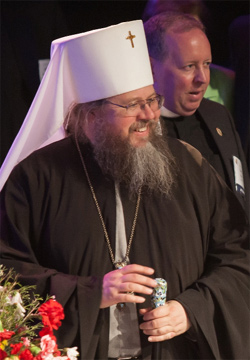
Over the past three years our churches have conducted a theological dialogue, discussing the issues that separate us, issues that are not so much OCA vs. ACNA, but issues that separate Anglicanism from Orthodoxy. This has focused on the issue of the filioque, the addition by the Roman Church to the Nicene Creed, forced on the entire Western Church in the 11th century, and this, disrupting the unity of the confession of the Catholic Faith.
I would remind you that the root and foundation of the Church of England is not “Roman” but rather, the broader Orthodox Catholicism that prevailed until the Roman Church began massive changes in the Second Millennium. The English Church was a local Orthodox Catholic Church in communion with Rome and the rest of the Churches for most of the first millennium. Part of the English, and even continental, Reformation was intended to bring the Church back to its original roots, free from the changes that occurred during the isolation of the Western Church in the Dark Ages and Middle Ages. The Orthodox see the Reformation as having gone awry, and reinforced the very elements that made the Western Churches’ theological positions idiosyncratic, thus isolating it even more from Orthodoxy.
My hope is that we can roll this back. You have the opportunity to return your Church to its original heritage, and thus actualize the rich inheritance of English Orthodox Catholicism, in communion with its root tradition. This means the overcoming of generations of schism, a schism which was forced on the English Church, and then a perpetual state of schism for itself and the churches established by it in its colonies and missions. This needs to be healed.
The ecumenical hope is to overcome the schisms of the West, so that the English and Roman Churches can again take their place within the communion of the One Orthodox Catholic Church. You have an immense role and opportunity within this. Removing the filioque is not simply a nice gesture of ecumenical solidarity; it is, rather, an affirmation of the ancient faith of the Undivided Church.
Realignment
There is another element in this which is of immediate importance, and directly follows on the above. As was written about by Robert Terwilliger, a great Anglican divine of the 20th century, there is a coming realignment within Christianity, one which we can already see the strains of. Whenever schisms happen within the Church, they are generally because certain individuals lead a group out of the Church, being disobedient to the Faith and Doctrine, and refusing to submit to the authority of the hierarchy, which is trying to discipline them and call them to repentance.
What is happening now is somewhat different: a split between those who hold to traditional, biblical faith as interpreted by the Fathers of the Church and the ecumenical councils; and those who espouse a secularized belief, subject to the rationalizations of the scholars according to contemporary philosophy, who dismiss the Fathers and the Councils as no longer relevant, who dismiss the moral teachings of the Scriptures and Fathers as culturally relative. This could be called, by one side, a break between traditional Christianity and post-modern worldly philosophy. Or it might be labeled as the freeing of people from fundamentalist oppression to the light of their own reason.
This is not the protestant/catholic divide; it is not the evangelical-charismatic vs. mainline divide. It cuts across all communities in the West, even affecting the Orthodox and Roman Churches in some degree. As Anglicans, you are no strangers to this: it is the reason you are here, and not in TEC. It is creating a massive realignment within Christianity; those who hold to the traditional Scriptural and patristic Faith and discipline of Orthodox Catholicism; and those who reject it, criticize it, and I will add, as you well know, persecute it. You and the ACNA are part of that realignment.
There is a radical cultural shift away from traditional Christianity, toward something unrecognizable. The “Secularists” (for lack of a better, non-pejorative term) reject the virgin birth of Christ, the resurrection, even His Divinity; that His words are recorded in the Scriptures and that the Scriptures are even relevant to our days; rather they are oppressive and keep humans in darkness. Another Episcopalian bishop, a certain Mr. Spong, wrote that “Christianity must change or die,” referring to traditional orthodoxy, espousing the radical secularization of the Episcopal Church and all Christianity. It is my prediction that it is not the Orthodox Churches that will die.
Solzhenitsyn said that “what the Soviet death camps could not do, Western secularism is doing more effectively. In Russia, 20 million died in the last century as martyrs for the Orthodox Faith, and countless millions of others were thrown in the gulag, for standing up against militant secularism. Many perished because they resisted the Renovationists whose schism distorted the Orthodox Faith. Whether you call it Soviet atheism, or Western secularism, it is the same enemy.
Our battle is against secularism. His Holiness, Pope Benedict XVI, has called for us to stand together against this enemy. This is the realignment: to stand together for the faith once delivered by Christ to the Apostles, and thence to the Bishops, without alteration, without change, without revisions; against those who would submit their faith to the current of the age, the wisdom of this world. We must stand together, and we cannot stand alone. Even the immense Roman Church is buffeted by the militant secularists, who defy authority and criticize that which they know not, and we can see in this country how increasingly fragile their unity is.
Brothers and sisters, we must embrace the Cross of Jesus Christ, the foolishness of the Gospel, the wisdom that is not of this world. We must rejoice in the salvation that God has given us in His Son Jesus Christ, who was crucified for us and rose from the dead. We glory in His Resurrection, and await His Coming Again. We must overcome the divisions that separate us, so that we can stand united in one mind and one heart, confessing that God has come in the flesh to raise us to heaven. We must live according to the moral and ethical commandments of our Lord Jesus Christ enshrined in the Gospel, and reject sin and recognize its corruption. This is the orthodox faith of the Fathers, the Ecumenical Councils and the undivided Church. We will have to accept the scorn and derision of those who are of this world, even those who call themselves brethren, being cast out of their synagogues and ridiculed, sued in civil courts, and count all things as worthless that we have lost for the sake of Christ. This, my friends, is our cross. We have to support one another in bearing it. The closer we come, the greater our mutual support will be, and we will not lose heart, or forget that Christ has already won the victory: He has overcome the world. By accepting to go by way of His Cross, we too will share in His Victory.
Let us listen to the words of St. Paul:
I appeal to you, brethren, by the name of our Lord Jesus Christ, that all of you agree, and that there be no dissensions among you, but that you be united in the same mind and the same judgment. For it has been reported to me by Chloe’s people that there is quarreling among you, my brethren.What I mean is that each one of you says, “I belong to Paul,” or “I belong to Apollos,” or “I belong to Cephas,” or “I belong to Christ.” Is Christ divided? Was Paul crucified for you? Or were you baptized in the name of Paul? …
For Christ did not send me to baptize but to preach the gospel, and not with eloquent wisdom, lest the cross of Christ be emptied of its power. For the word of the cross is folly to those who are perishing, but to us who are being saved it is the power of God. For it is written, “I will destroy the wisdom of the wise, and the discernment of the discerning I will thwart.” Where is the wise man? Where is the scribe? Where is the debater of this age? Has not God made foolish the wisdom of the world? For since, in the wisdom of God, the world did not know God through wisdom, it pleased God through the folly of what we preach to save those who believe. For Jews demand signs and Greeks seek wisdom, but we preach Christ crucified a stumbling block to Jews and folly to Gentiles, but to those who are called, both Jews and Greeks, Christ the power of God and the wisdom of God. For the foolishness of God is wiser than men, and the weakness of God is stronger than men. (1 Corinthians 1:10-13, 17-25, Revised Standard Version)

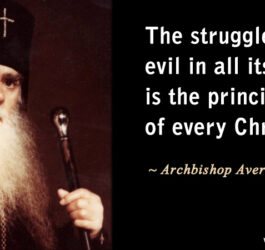
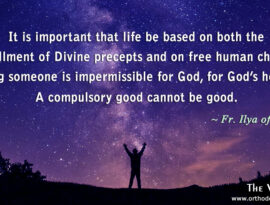
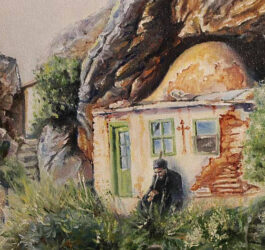
I agree with much in this article even though I don’t identify myself as Christian. I don’t agree with the word ‘secularism’, though, I think the enemy is ‘materialism’. These are actually different things. A secular society is simply one in which persons are free to practice any religion, or none. But it is not a foundational philosophy in its own right. There is no ‘bible of secularism’ as it does not rest on first principles. It is materialism which holds that man is purely the outcome of chance occurences on the molecular level. But I think it will become clear that this belief system will destroy itself, though. If it is true that everything is meaningless, as they say, then their attitude is also meaningless. They actually have nothing to say, and that is going to become very clear as all of this develops. So I am not as pessimistic as you. I think that the need for transcendent values is real, deep, and permanent, and it won’t be defeated by shallow materialism.
Metropolitan Jonah was likely lumping together modernism and postmodernism in identifying the ideological and imminent adversaries of the Gospel. He is correct in doing so.
The modernist/materialist/scientific-rationalist current that has spawned radical atheism is far from washed out. This worldview often affirms that at least some things in the created realm can be known, and that this knowledge can be trusted and used for good. It can make valuations as to good and better. God can exist in this worldview. Good is often seen as an evolutionary adaptation, and God is often relegated to the gaps rather than seen as the author of all that is visible and invisible. Because this materialist framework generally maintains that some truth claims are valid (so long as the materialism is not too strident) An orthodox Christian can work more comfortably within modernism than within it’s bastard offspring – postmodernism. But Christianity isn’t about being comfortable.
The postmodernists occasionally try to duct-tape God onto their anti-doctrine when it is opportune, but they usually condemn the meta-narrative of Christianity as abusive or oppressive. That is the what they do; deconstruct meta-narratives. There is no good or better or best in this worldview, only relative and reflexive narratives. Each individual or social narrative is either cooperating or competing for power and being politically abusive and violent in the process.
This is completely antithetical to Christianity and it is more than just meaningless, it is cynical, entropic, and ultimately suicidal because the meta-narrative of postmodernism eventually eats itself. In it, there is absolutely no room for the biblical narrative of Judeo-Christian anthropology – that of the prototype human in perfect loving fellowship with God, then through misuse of his freedom bringing physical death, alienation from God, separation of man and woman, mind and heart, and indeed, a complete and total corrosive transformation of the material and spiritual orders. Postmodernism ignores man’s past and current states, and so it cannot accommodate the idea and need of salvation through a dead and risen Christ. The Christian cannot adopt this worldview any more than matter and anti-matter can exist in the same space. You cannot serve two masters. Postmodernism is the ultimate secularist worldview.
Secularism/postmodernism may try to disintegrate the meta-narrative that God implanted on all humans hearts – the narrative beyond language – that of his loving image – that is its imperative. This will be futile, but it is the battle of Christianity in the present. We already know that the war was won on the Cross, I share your optimism, but Christians need to put on the full armor for this challenge.
“Secularism” is one description of the marterialist phenomena. The attack against the Church, against Christ, is described well by the Metropolitan. We Orthodox are few in numbers in the United States, but we must stand clearly with our bishops and speak the truth. This is the ecumenism most needed. God help all Right–believing
Bishops and priests.